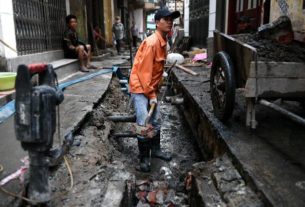An environmentalist yesterday blamed Suvarnabhumi Airport for the flooding in many areas in Bangkok
Speaking at a seminar on “Bangkok: The Underwater City”, Stop Global Warming Association president Srisuwan Janya said he and affected people would sue Suvarnabhumi Airport executives in a bid to get the government to take responsibility for the damage it had done.
The House committee on natural resources and environment organised the seminar at Parliament House.
Another panellist, Smith Dhammasaroj, a director at the National Disaster Warning Council, said the risk of prolonged flooding in the capital was real.
“It’s possible that floodwater may rise to between 50 centimetres and one metre. When that day comes,
Smith said
He recommended the creation of more water-retention areas and installing sluice gates on key rivers.
Samut Prakan Senator Surajit Chirawet, meanwhile, suggested that canals be used to efficiently manage water levels.
The Network for
Supachai Tantikhom, an adviser to Bangkok Governor MR Sukhumbhand Paibatra, explained that
“The government has also taken tough measures against private entrepreneurs who have illegally dug down and drawn up artesian water,” he said.
Drawing up artesian water is widely blamed for causing serious land subsidence in
Smith, who predicted The tsunami before it occurred, faced many questions about the possibility of a new round of tidal waves yesterday after a famous fortune-teller said a disaster would hit the southern part of
“I am not in a position to comment as the government will not listen to me anyway,” he said.
But he said the early-warning system should be improved so it is fully effective and may reduce damage and casualties if a disaster occurs.
By Kanittha Thepjorn
The Nation


